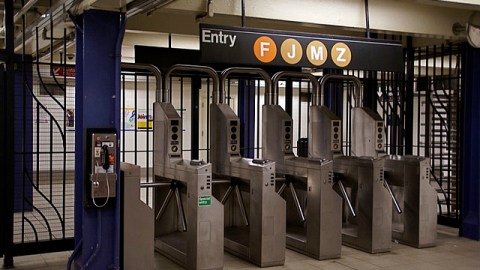The Apologist’s Turnstile

As I’ve often mentioned, religion has a set of cognitive tricks – unconscious ideas, prejudices and habits of thought it tries to instill in believers – which shield their minds against contrary argument and make it less likely that they’ll leave the faith. One example is the selective wall I’ve written about in the past, also dubbed “Morton’s demon“, that lets supportive evidence pass through while blocking contradictory evidence. Today, I want to discuss a different but equally commmon one: the idea that no particular level of knowledge is needed to assent to a religion, but an impossibly, unattainably high level of knowledge and expertise is needed to deny it. In the minds of many believers, the entrance to their religion is like a subway turnstile: a barrier that only allows people to pass through in one direction.
This is similar to the tactic called the Courtier’s Reply, the silencing argument often used against atheists which holds that no one is qualified to criticize a religion in any particular unless they’ve completed a total study of its most esoteric doctrines. The difference is that the Apologist’s Turnstile adds the assumption, implicitly or explicitly, that none of this knowledge is necessary to join or to be a member of that same religion.
I once saw this tactic at work in a letter from a correspondent of mine, John, who’d been, in his words, a “strong Catholic” for six years, had worked full-time for a Catholic outreach group, and described himself as having made major life decisions on the basis of answers received through prayer. But after coming across some atheist arguments after doing a web search on a whim, he was having major doubts about the truth of Christianity. When he disclosed some of these doubts, another member of his church group counseled him as follows:
What I’d like to do is to appeal to you to withhold judgment – to avoid starting to “land” anywhere in your quest – until you have really given Christianity and theism your best shot. I think you have a very long way to go in this regard…
John’s correspondent then listed half a dozen Christian apologetics books and urged him to read them all, adding “For now, stop doing research online and listening to/watching debates. Also stop, for now, reading atheist and agnostic stuff”.
This is a perfect example of the Apologist’s Turnstile. In John’s case, the knowledge he already possessed from his long time as a faithful Christian was suddenly deemed insufficient when he announced he had doubts and was thinking of leaving. No one demanded that he read these books while he was a believer, even though he himself was doing outreach work for the church. But when he started wavering in his beliefs, his not having read them was treated as a massive obstacle, one that prevented him from making even basic decisions. (I’m happy to report that this obvious stalling tactic didn’t work. Hi, John!)
You’ll never see this unequal standard applied to theists, of course. No quizzes are given out to ordinary believers in the pews. No one walking in the doors of a church is stopped by a theologian who says, “Hold it! Until you’ve completed a rigorous Th.D program and read books by a dozen famous apologists, you don’t have enough evidence to decide for yourself whether you really believe this.” To be consistent, the sophisticated apologists and theologians would have to bar the doors of their own churches against a majority of the congregants.
But that never happens in real life. Most churches will welcome any applicant with open arms, regardless of how much or how little they know about the beliefs being taught there. They’ll even accept children as members, so long as those children can be taught to say the right words during the commitment ritual. (In an old post, I related the story of a Christian acquaintance of mine from college who claimed to have accepted Jesus into his heart at the age of five; he didn’t seem to find this unusual or questionable when he related it to me.) No, this impossible level of expertise is never demanded of anyone seeking to join a religion – it’s only ever demanded of people who are criticizing it from outside, or who are considering the idea of leaving.
The implicit assumption behind this tactic is that criticizing or denying a religion should require more knowledge about its teachings than joining it. But in reality and in logic, the opposite should be true: Assent should require a larger amount of evidence than denial, if only because the person who makes a positive claim always has the burden of proof to support it. An atheist is perfectly justified in saying that they disbelieve a religion because they know of no evidence in its favor, but a theist is never justified in saying that they believe a religion because they know of no evidence against it.
Image credit: saitowitz, released under CC BY-SA 2.0 license





